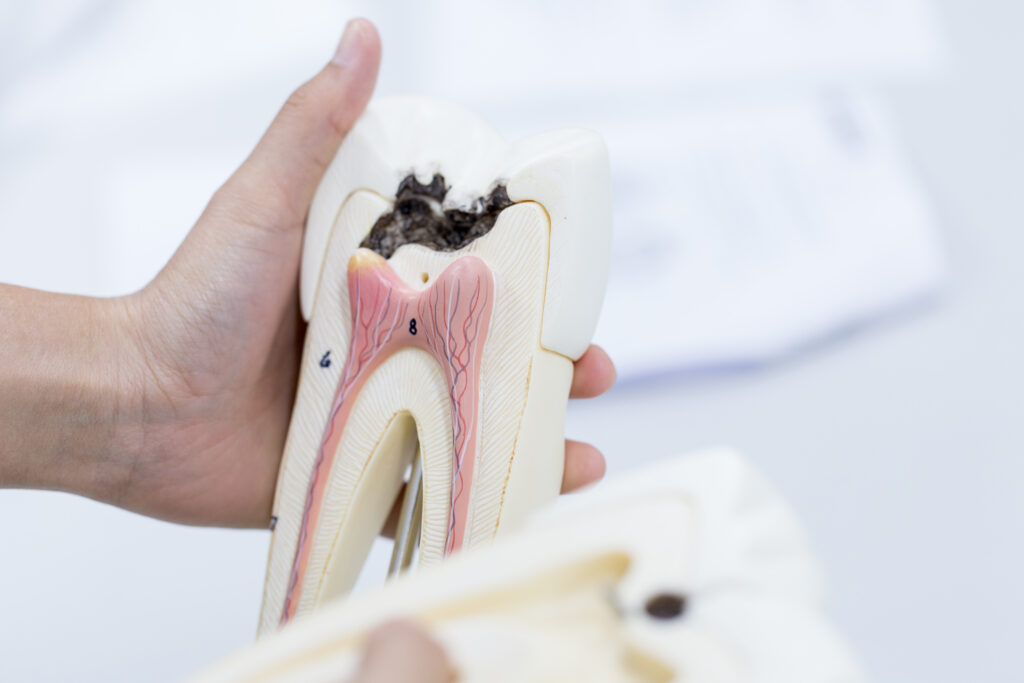When a tooth becomes infected, this could cause painful aches and sensitivity that grows worse with time, and could spread to other parts of the smile. But with endodontic treatment, we can treat issues with the interior of your tooth and stop the infection. In today’s blog, your Londonderry, NH, dentist talks about our endodontic treatment options.
The Causes of an Infected Tooth
What causes a tooth to become infected? When a cavity forms, this means harmful oral bacteria have bypassed the protective layer of enamel and reached the sensitive dentin, which makes up most of your tooth. With an infection, the decay has spread through the dentin and made contact with the pulp, the nerve center of your tooth. Once this happens, the tooth is infected and treatment is needed before the infection kills the pulp and effectively causes the tooth to die. At this point, the infection could spread to other teeth and into the jaw. The tooth is lost or may require extraction. Factors behind an infection include untreated cavities or injuries to the teeth.
Warning Signs to Watch For
What warning signs should you watch for? With an infected tooth, you could have persistent tooth sensitivity when you eat or bite down, and a toothache could form that grows in severity and doesn’t subside with time. You may also notice swelling near your tooth, pain in the face or jaw, or even a discharge from the tooth itself. When these symptoms arise, you need to see us right away. Once your tooth is causing pain, this means the infection is advanced and treatment is crucial for avoiding lost teeth or compromise surrounding ones.
The Root Canal
Our team can offer treatment with a root canal. To begin, we will take detailed digital x-rays of the tooth, obtaining high-definition images instantly chairside using 90% less radiation. The images allow us to assess the position and severity of the infection, so we can plan the root canal in detail. To ensure you are comfortable, our team will numb the tooth and could even discuss dental sedation if you have anxiety about dental treatments.
We then open the tooth and will remove the tissue from within and thoroughly clean the interior of your tooth and the root canals themselves. The next step is to fill the interior of the tooth with a restorative material known as gutta percha. Once we do, we next cap the tooth. A custom-made crown is crafted and placed onto it, protecting the tooth from further decay or infection. We also shade it to blend with your smile and provide a lifelike appearance. The procedure helps save your tooth and keep your smile whole!
The Retreatment Process
Our team also offers retreatment. If you had a root canal done at another practice and in the months or years since the tooth begins to hurt again, you need to reach out to our team for retreatment. We want to avoid the loss of the tooth and the spread of infection. Our team will essentially conduct a new root canal, opening the tooth to remove the filling material and any remaining tissues. We then add new materials to the inside of the tooth and attach a crown. The need for retreatment could be due to a poor fitting restoration or contamination during the initial endodontic treatment.
Root Canal Surgery
What if the infection occurs not in the interior of the tooth, but in the tip of the root canals themselves? In cases like these, we may need to conduct a root canal surgery, also known as an apicectomy. Our team will open the gums near the tip of the tooth, so we remove the tip and the infected tissues. We then cap the tip of the root and suture the area closed. This will heal quickly, and stop the discomfort and the risk of tooth loss. Again, we will take measures to ensure your comfort with anesthesia and sedation. We also offer detailed aftercare instructions and prescriptions for medications to ensure the healing period is fast and effective.
If you have any questions about how we stop discomfort and treat your smile with a root canal, retreatment or even a surgical procedure, then reach out to our team today. Don’t live with pain in a tooth, talk to our team about possible solutions so you can smile with confidence and without discomfort.
Do You Have An Aching Tooth?
Don’t let a painful dental issue impact your quality of life and cause tooth loss. To schedule an appointment at My Dentist in Londonderry, NH, call 603-965-3407.



